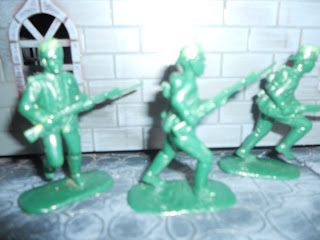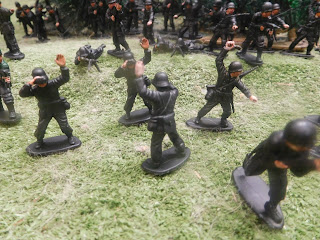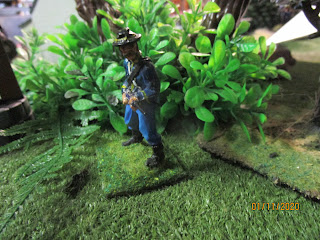Poppy's Photos of New Britain in WW2
I was very close to Poppy, my maternal grandfather. He was a friendly, polite man who never swore or drank alcohol. He used to bring classes of lemonade to the 'postie' when he delivered mail. He said hello to anyone passing his immaculate garden. He teased me with his jokes and would sing songs, like The Wizard of Oz every time we drove somewhere. He fixed bicycles and lawnmowers and many other mechanical things around the house. We laughed together when The Three Stooges was on TV.
As a child I was raised by my divorced mother and her parents in East Bentleigh, Melbourne. I remember, in the 1960s, that WW2 did not seem that long gone. Poppy (Horrace Darvell) had been in the RAAF in the crashed aircraft recovery, when he was stationed in New Britain (a large island off New Guinea). I saw his exotic war photos of natives and American planes with naked or half naked young nubile women painted on their noses.
Poppy really admired 'the Yanks' and their military might, as he was very conscious of their role in defending Australia. He used to say, if not for the naval battle of the Corral Sea, which defeated the Japanese naval force, 'We would all be pulling Rickshaws down Bourke Street (in Melbourne).' Britain, of course, was our other important partner but it was also busy on its home front and in the Middle East.
In reality, Japan did not intend to stretch its resources to taking over Australia as they had other fish to fry. However, as poppy, would mention, the Australian authorities had tried to downplay the Japanese bombing of Northern Australia, places like Darwin and Broome. My dad (who I remained in regular contact with) mentioned a story of a dunny 'pan man' (toilet emptier) who, on the bombing of Darwin took off with his dunny truck, pans a bouncing, and kept driving until he got to Alice Springs.
The Japanese had delivered a shock with their capture of Hong Kong, Malaya and Singapore. New Guinea was a very close thing with the Japanese pushing their way towards Port Moresby. People today still go there to walk the Kokoda track where Aussie soldiers fought 'the Japs'. The 'Chocolate Soldiers' delayed the Japanese advance until the regulars arrived to help push them back. The reservists were obligated to serve in Australian territory (which included the new Guinea protectorate (Australia's only colony, captured from the Germans in WW1). The regulars jibed that they would melt in the face of the enemy, but they earned their respect. Many of the regulars were taken from the Middle east to defend Australia, something Winston Chruchill was less happy about given the importance of fighting Germany in North Africa. But Australia now was locked in its own fierce battle.
Meanwhile, my paternal grandfather was captured in Singapore and was sent first to Changi prison and then to Sandakan, Borneo, where, he and the vast majority of thousands of Allied prisoners there died from poor conditions or a forced march. (He died before the 'march)'.
After the war my surviving grandfather bought land in Melbourne's South-East suburb of East Bentleigh, with assistance given to veterans. It was mostly market gardens, at the time. He, his wife, May and two children lived in an asbestos garage while their house was being built and then Poppy painted it and also his Ford with the same pale green paint and with the same paint brush.
I need to correct the label below as Monty Banks was American, although Gracie Fields was British.
I really like 'Ten Knights in a bar room' and one day I might paint that lady riding a Pegasus on one of my SF flying vehicles. There was a mid 19t century novel called Ten Nights in a barroom' which was made into a 1920s movie warning about alcohol consumption. There was a Flying Fortress plane, with the name 'Ten Knights in a Ballroom' shot down over Europe. I don't know if it is the same plane or if more than one plane had the same name. What it means I don't know.























Fabulous - many thanks for posting these photos.
ReplyDeleteThank you for sharing your Grandfather's war stories. All gave something, and some gave everything.Our generations should be grateful for their service. Interesting photos too.
ReplyDeleteThe 'Defensless Virgin' and 'Annie Oakley' Nose Arts seems to be on Dakota C47 transports and the 'Ten Knights' nose art seems to be located on a B24 Liberator bomber.
Thanks for sharing this James!
Very Interesting to see your family’s fresh unseen private snapshots view of a historical event. The aircraft modellers will like this!
ReplyDelete